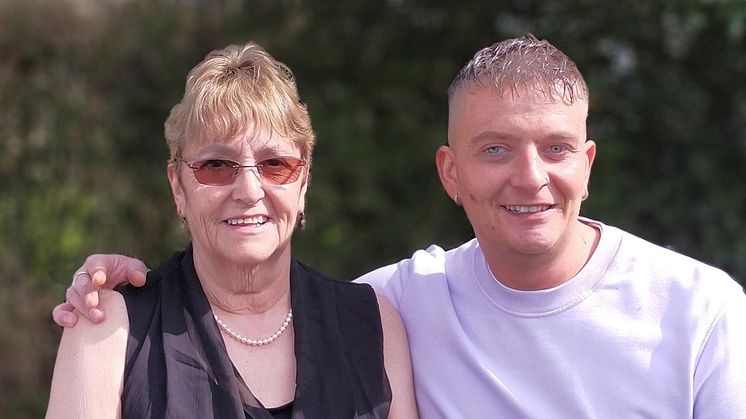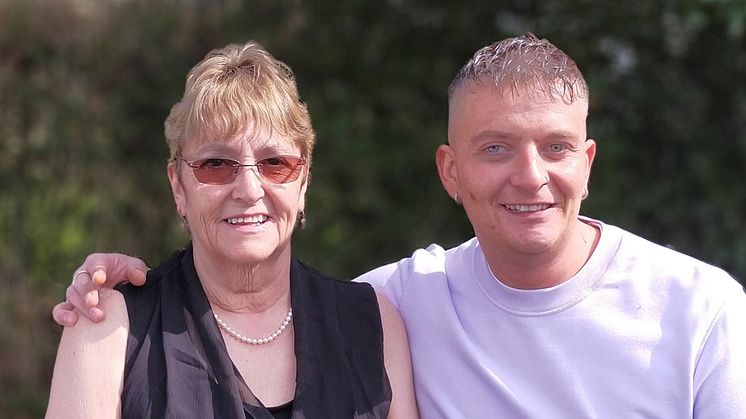
Press release -
Cornwall Emotional Support Service helped stroke survivor Dave and his mum Jackie start to cope
The severe stroke that talented carpenter Dave Parkyn had in August 2020 devastated many lives but particularly his own and that of his mother.
Dave, then aged 28, was left blind in his right eye and partially sighted in his left and physically disabled, his hopes and dreams for the future shattered.
His mum Jackie blamed herself for not pushing the 111 service and GP harder for treatment for Dave as for him to be so unwell was extremely unusual. Within two days of him coming home from work unwell he was fighting for his life in Intensive Care in a medically induced coma with machines sustaining all bodily functions.
Unbeknown to either Dave’s family or the medics, Dave had got a splinter in his hand at work which had festered and this led to bacterial meningitis and it was the actual infection which rampaged through his body causing massive and severe strokes.
In the two years since then the family, who live near St Austell, have struggled with the huge emotional toll but now, thanks to the new service recently launched by the Stroke Association, they feel that that they can at least start to come to terms with what has happened.
Jackie, 65, explains: “Dave came home from work with massive headache and feeling really ill. He deteriorated through evening and was in intense pain so I rang 111 for advice. He deteriorated further through night so I rang 111 again and they arranged GP appointment for first thing the next morning.
“He saw the GP who diagnosed possible a pulled muscle in his back which was causing the headache. He was sent home and told to come back in couple of days if no better. When he deteriorated further that night, I rang 111 again and an appointment was arranged at the local M.I.U for the next morning.
“The doctor there consulted with the main hospital in Cornwall and they thought it possible he had suffered a bleed on the brain and wanted him admitted. There were no ambulances so we had to take him by car as he was deteriorating by the minute.
“When Dave arrived at hospital, some 26 miles away, he could barely stand and I half dragged him into the receiving ward.
“The hospital rang us three hours later asking if he was conscious on arrival and whether his eyes were open. We said yes to both and hospital said ‘Well, they aren’t now’. He is very ill and we don’t know what’s wrong but he will be admitted to Intensive Care” and to ring again in morning.
“We were allowed to visit the next day and he was in a medically induced coma, connected to all manner of machinery to breathe for him and maintain bodily function. We were told he was incredibly ill and that things could ‘go either way’.
“It took five days for the hospital to isolate type of infection and they eventually found staph aureus PVL which is very rare.
“Dave also had pneumonia, chest abscesses and sepsis. Later that week we were advised that the life support would be switched off if he showed no sign of improvement.
“The infection rampaged through his body and settled in his brain causing massive strokes.”
“It has devastated Dave’s dreams. He has lost his income, his self-confidence, pride and ambition. He planned a future with a wife and family, was buying his own house, had just started his own business and everything, absolutely everything changed.
“It is ironic that in 2019 he travelled Australia on his own, working both as a carpenter and on a banana plantation and dodged the snakes and spiders there only to come home and fall foul of a simple splinter. His plan to go to Dubai and Germany to experience life and work there is gone and in just two days all our lives were altered forever!
“For my part, I have deep guilt that this is all my fault because I did not act fast enough or was not demanding enough to get him the help he so desperately needed. I was mollified by the 111 calls and the GP when I should have known that as Dave has never ever been ill, this was indeed an extremely serious event.
“I cannot move on from the guilt I have but I suppose that’s part of being a parent but Dave insists I did all I could. When I see him struggle to do something I am feel strongly that this was caused by my lack of action.”
Both Dave and Jackie were hesitant when they were offered a referral to the Stroke Association’s new Cornwall Emotional Support Service, with each seeing a different counsellor. But they say that simply being able to talk openly about their feelings has made a real difference.
Dave said: “I didn’t think it would help and I was reluctant to go through with it but I’m very pleased that I did. I spoke to Manu about everything, my feelings of humiliation and worthlessness, my lack of confidence and my embarrassment at how I now felt I looked.
“It helped me think about how to let out my anger and frustration which is a huge part of the healing process. It was just nice to be able to talk to someone and share my feelings and not feel judged.
“We spoke about lots of things. We talked about friendship. I’ve lost a lot of friends since it happened. When I come out after our sessions I feel like big weight has come off my shoulders.
“I’m never going to get all the answers I need but it’s a way of dealing with what’s happened.”
Jackie said: “The counselling from the Stroke Association has helped us both get what has happened in a better perspective, although neither of us will ever really accept how this has devastated his life.
“Maybe I’m not going to get over the guilt, but I have realised that I need to accept it and move on. Fern, my counsellor, was brilliant. She enabled me to think and reflect and simply talk openly and honestly because she knew no one involved, she was a complete stranger. She never once told me what or how to think or feel but helped me explore my feelings and come to some sort of acceptance of them.
“As a family it has changed all our lives. My husband Barry and I are retired and Dave’s brother Nick has severe learning difficulties. We have a great day care and social package in place for him but we never for one moment anticipated needing to care and help Dave.
“Dave’s sight in his left eye has slowly improved but not enough to allow him to drive. He is totally blind in his right eye. He has left side hemiplegia with limited use of his left arm and struggles to open and close his hand. His left leg and particularly his foot is weak and he cannot flex or move his foot voluntarily which makes walking difficult and awkward for him and is another cause of his lack of confidence.
“We are immensely and incredibly proud of Dave and all he has achieved and all he will go on to achieve.”
“Dave will never fully be able to the job he loved so much but has recently returned to work as a carpenter, although not in the same capacity as he formerly was.
“He is now beginning to accept some of what has happened and is trying to re-build a career and a life, albeit different to the one he planned.”
Topics
- Stroke strikes every five minutes in the UK and it changes lives in an instant.
- The Stroke Association is a charity working across the UK to support people to rebuild their lives after stroke. We believe that everyone deserves to live the best life they can after stroke. From local support services and groups, to online information and support, anyone affected by stroke can visit stroke.org.uk or call our dedicated Stroke Helpline on 0303 3033 100 to find out about support available locally.
- Our specialist support, research and campaigning are only possible with the courage and determination of the stroke community and the generosity of our supporters. With more donations and support, we can help rebuild even more lives.
- You can follow us on Twitter, Facebook and Instagram.



